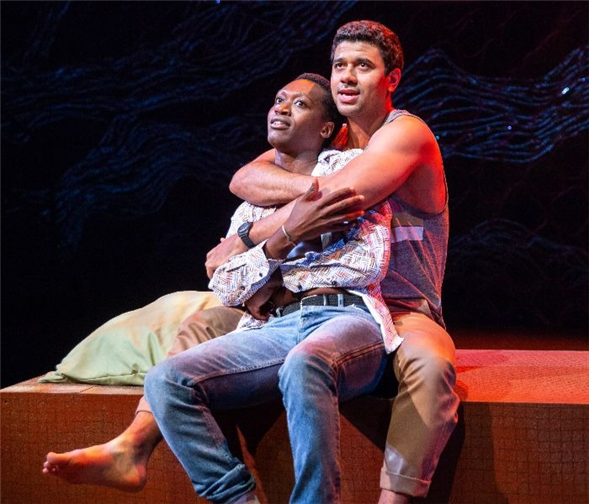Translate Page

British playwright Chris Urch makes his U.S. debut with the Uganda-set drama The Rolling Stone at Lincoln Center
---
When British playwright Chris Urch first learned about the "Kill the Gays" legislation proposed in Uganda in 2011, he couldn't help but take it to heart. As a gay man himself, the prospect scared him both politically and personally. "I came across an article about this tabloid newspaper in Uganda called The Rolling Stone, about how they were outing men and women in the community by publishing their names and photos," Urch recalls. "People's lives were utterly destroyed -- some had to leave their families and some were murdered." Frightened as well as fascinated, he started researching the situation. "It got me thinking: What happens to a family? What would you do if you knew that your brother or sister or uncle was gay and you had to report them or risk imprisonment yourself?"
He turned his investigation into The Rolling Stone, which is having its U.S. debut at Lincoln Center Theater's Mitzi E. Newhouse Theater. Set in 2010 as the anti-homosexuality bill was being debated by the Parliament of Uganda, the drama centers on Dembe (Ato Blankson-Wood), a Ugandan man forced to conceal his romance with a biracial man from Northern Ireland (Robert Gilbert) from his tight-knit family, especially his pastor brother Joe (James Udom).
"If you are going to be political, which this play is for me, the politics have to come through the personal," explains Urch. "And the personal is the love story and the family story. We can all relate to falling in love and we can all relate to family dynamics. Some of the characters say or do things that we may not agree with, but they are coming generally from a place of love. And if not from love, it's from a place of fear."
Urch began his theatre career as an actor, which he describes with a laugh as "a massive failure," though he adds that's what led him to playwriting. His first break as a dramatist came in 2013, when he won the U.K.'s Bruntwood Prize for Playwriting for an early draft of The Rolling Stone. "That gave me enough money to support myself for eight months to a year as a writer," says Urch. "I thought, this is now or never!"
He quickly made good on his promise. That same year, he made his West End debut with another history-inspired play, Land of Our Fathers about a Welsh coal miners strike in 1979. In 2015, a revised version of The Rolling Stone received its world premiere at Manchester's Royal Exchange Theatre before transferring to London. Now 32, Urch is a rising star on Britain's stage scene and is also penning the screenplay for a biopic on the late designer Alexander McQueen.
{Image1}
As he developed The Rolling Stone, Urch admits he was keenly aware of his privileged outsider perspective. Not only is he a white Westerner writing black African characters, he also comes from the country that colonized Uganda, which helped pave the way for its fundamentalist Christian homophobia. "I was very wary," he says, but adds that during workshops, actors of color and Ugandan consultants "really helped to shape the play." In addition, Saheem Ali, who was born and raised in Kenya, is helming the Lincoln Center production. The director traveled to Uganda and brought back photos and videos of modern-day life in the country's capital, Kampala, to share with the cast.
With the rise in anti-gay hate crimes in many nations, including the U.S. and the U.K., plus oppressive legislation in various countries, including Uganda, where homosexuality is currently punishable by life in prison, The Rolling Stone is, regrettably, as relevant as ever. But Urch provides a path to redemption through the empathy he shows for all his characters, even the ostensible villains. "We all screw up and we all say things that we wish we could take back," he says. "Our beliefs come from somewhere, regardless of whether people deem them to be right or wrong. I hope that this play gets people to think and engage and be more tolerant of one another."
---
TDF MEMBERS: At press time, discount tickets were available for The Rolling Stone. Go here to browse our current offers.
Gerard Raymond is an arts journalist based in New York City.
Ato Blankson-Wood and Robert Gilbert in The Rolling Stone. Photos by Jeremy Daniel.